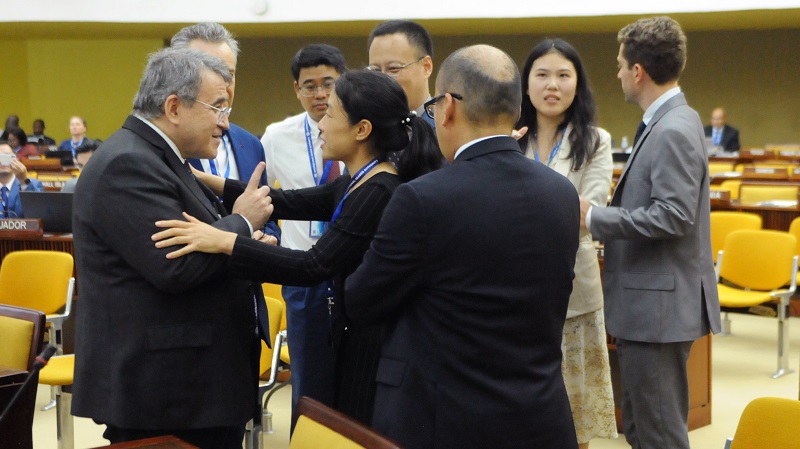While China blocked a ban from this year’s seabed talks agenda, hopes are now high that it will be officially discussed next year
A halt on companies digging up the deep seabed for valuable metals is now a real possibility after governments agreed to put it on the agenda for international talks this time next year.
It’s the first time this proposal will be formally discussed at a UN international body.
For the past three weeks, governments gathered in Kingston, Jamaica, at a little-known UN agency called the International Seabed Authority (ISA), to discuss a moratorium on mining on the deep seabed in international waters. No companies are currently carrying out such projects yet.
A coalition of nations pushed for a ban to be placed on the agenda but were opposed by Mexico, Nauru and most persistently by China. Towards the end of the meeting though, they won a concession agreeing that it be put provisonally on the agenda next year.
Greenpeace campaigner Louisa Casson was at the talks and said this was “incredibly exciting” and that deep-sea mining has now become”less likely” while Costa Rica’s negotiator Gina Guillen-Grillo tweeted that there will be a discussion on a temporary ban next year.
Proud of the results of hard work led by likeminded countries🇨🇷🇨🇱🇻🇺🇵🇼🇫🇷 with the support of many others,this week at the ISA.
We achieved that next ISA Assembly will have stand alone discussion of General Policy for the application of Precautionary Principle @CRcancilleria pic.twitter.com/YMwA427BSy— Gina Guillen-Grillo (@GinaGGCR) July 29, 2023
But other environmentalists were less upbeat. Bobbi-Jo Dobush from The Ocean Foundation told Mongabay that China’s blocking of talks on a ban “squandered hours of much needed discussion time” and deep sea scientist Patricia Esquete said the blocking of talks was “very concerning”.
The mining companies claim that minerals like nickel and cobalt are needed in batteries and will help speed up the energy transition but environmental campaigners like Casson dispute this, saying that more mining isn’t necessary and deepsea mining will damage ecosystems we still know little about.
Agenda fight
In Kingston, a coalition of over a dozen countries spearheaded by Chile, France and Costa Rica tried to officially debate for the first time in history the possibility to ban deep-sea mining until its full impact on the ocean’s biodiversity is understood.
Hervè Berville, the French Minister for Marine Affairs, told the Assembly on Wednesday that the world “must not and cannot embark on a new industrial activity without measuring the consequences and taking the risk of irreversible damage”.
But China, Mexico and the Pacific island of Nauru opposed a halt. While Mexico and Nauru relented, China continued to oppose even putting a moratorium on the official agenda saying it was “not suitable” for discussion.
Gina Guillén, head of the Costa Rican delegation said “just one country is opposing [the agenda item on the discussion]. We hope it does happen. One country can’t hijack the most important body of the [ISA] just for being a big economy. That goes against all principles of multilateralism.”
In a bad-tempered last day of talks, China’s negotiator Wenting Zhao defended herself, saying that if the agenda isn’t agreed “everyone will know who is responsible for this”.
France’s negotiator hit back, saying that those “who blame others are the responsible for this situation” and “if there is a responsibility, it is not ours, we have made concessions”.
Brazil seeks European trade advantages in return for Amazon protection
Eventually, governments agreed a compromise. They would not discuss a ban at this meeting but would put a discussion on the provisional agenda next year. This year it was only proposed for the supplementary agenda.
Casson said the discussion “would still need to be adopted by governments so [there] may well be pushback” but she said that moving it from the supplementary agenda to the provisional shows “substantive arguments against it have conceded”.
“This compromise does in effect accept that the ISA Assembly does have the authority to debate the development of a general policy of the ISA, including the possibility of a establishing moratorium on deep-sea mining. So arguably a small step forward but only the beginning of the debate in the Assembly,” Casson explained.
Time pressure
On the other side to
Read More







Never miss a story. Join us on social.